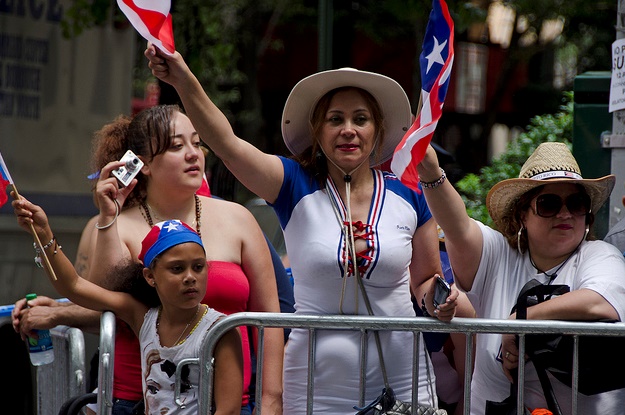In November, Ben Carson became the fifth 2016 U.S. presidential candidate to make a campaign stop in Puerto Rico. Though Puerto Ricans are U.S. citizens, none of the island’s 3.5 million residents can vote in presidential elections. So why do both Democrat and Republican candidates continue to spend time and money visiting the territory? Demographics play a role.
Campaigning in Puerto Rico has long been a way for candidates to garner favor with the Latino vote state-side. But as increasingly large numbers of Puerto Ricans flee economic instability and insecurity on the island – some 84,000 people left for the U.S. mainland last year alone – their influence on that vote is becoming more important.
At more than 5 million people, Puerto Ricans make up the second largest Latino-origin group living on the U.S. mainland. Take into account that more than 1 million of them live in Florida – a critical swing state with 29 electoral votes – and the political calculus becomes clearer still. And their influence shows few signs of waning: around 1,000 Puerto Ricans move to central Florida every week.
Such an influx is bound to have political implications. Puerto Ricans were already credited with helping President Barack Obama carry Florida by a razor thin margin in 2012. That helps explain why Republican candidates Marco Rubio, Jeb Bush and Ben Carson have all come out in support of Puerto Rican statehood, which some argue is the best way for Puerto Ricans to get equal treatment under federal law. Bush and Democrats Bernie Sanders, Hillary Clinton and Martin O’Malley have spoken in favor of legislation that would afford Puerto Rico the same municipal bankruptcy protections available on the mainland, an issue of particular importance to Puerto Ricans both on and off the island.
Puerto Rico narrowly avoided defaulting on a $355 million debt payment on December 1 through what Senator Richard Blumenthal called “unsustainable financial gymnastics.” Because the government used money earmarked for one group of bondholders to pay another – a maneuver known as a “clawback” – the island’s ability to meet a $357 million general-obligation interest payment coming due on January 1 is uncertain. In fact, at a recent Senate Judiciary Committee hearing, Puerto Rico’s Governor Alejandro García Padilla asserted that the clawback marked the beginning of Puerto Rico’s default on its debts.
But while the presidential campaigning on the island might suggest otherwise, in the end only Congress can legally act on most matters regarding Puerto Rico, including the debt crisis. That appears unlikely, at least in the short term. There have been five congressional hearings on Puerto Rico this year alone, none of which has produced any concrete action or legislation. On December 9, Governor García Padilla brought a delegation of lawmakers, mayors and business leaders to lobby members of Congress to act on the fiscal crisis in the spending bill due by year’s end, but Congress looks likely to put off acting on the full omnibus bill until after the new year.
The road to the White House may very well run through Puerto Rico – by way of Florida – but pronouncements from presidential candidates will mean little until Congress acts.
—
Leani García is the social media editor and production editor for Americas Quarterly, and the senior policy associate for Americas Society/Council of the Americas. Follow her on Twitter @LeaniGarcia.









